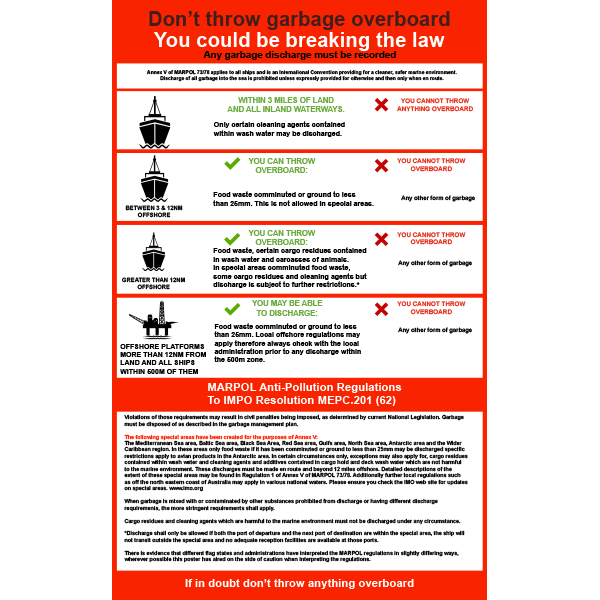Saving our oceans means saving our workplace.
When we do our STCW training to join yachting we hear about this thing called MARPOL and we learn about what is illegal to dump over the side. And if you have joined a yacht, you will have been made aware of the MARPOL book either in the crew mess, on the bridge, or both, that you should read. But do you actually understand it and what it means? We recently had World Oceans Day and if you follow us, you would have seen that we quoted some stats about the oceans and how they support us. We looked at environmentally friendly products that you can use onboard to help reduce the impact of pollution going into our oceans. But what do you really know about the laws surrounding Ocean pollution and have you asked the question, are they enough?
Quickly if you need a memory jog, because let’s face it when you first heard about it there was probably a lot of other things taking up your mind as well. What is MARPOL? It is,
The International Convention for the Prevention of Pollution from Ships (MARPOL) is the main international convention covering prevention of pollution of the marine environment by ships from operational or accidental causes.
It has 6 Annexes and which are split as follows:
i. Oil
ii. Noxious Liquid Substances in bulk
iii. Harmful substances in packaged form
iv. Sewage from Ships
v. Garbage from Ships
vi. Air Pollution form ships
Read in its entirety, it is a lot of information. So, what do you need to know, especially as yacht crew? Also, as I asked above, is it still relevant and effective? Like most things, we accept that it is what it is, and we have to know it, but not really think about it. Well, I am challenging you to ask questions. Are we doing everything we can to prevent pollution? Are the regulations best serving the maritime community and their needs to safe guard the future?
Without beautiful oceans and seas to cruise there would be no Yachting industry. Why would people buy very expensive yachts to sail around in sewerage? And pollution doesn’t just happen at sea, a lot of what is in our oceans comes from the land as well. Litter being washed into rivers; sewerage being dumped into bays and chemical waste. It’s a very real problem and I think one that needs to be addresses by everyone on land and Sea. We all need to work together and together we will make a difference. Don’t wait to be told to do it, don’t wait until someone does it for you, there are so many people out there doing great things and by you supporting ethically sourced yacht uniforms, using biodegradable products and banning single use plastic onboard for crew will make a huge difference. Also, educating yourself and being pro-active in ensuring that what we have in place now as per legislation is adequate for what we need to do.
So, what do you need to know? As a yacht we are only really capable of i., iii., iv., v., and vi. And as interior we directly impact on iii., and v. Have you ever wondered what happens to the water that goes down the drain on board and when the toilet is flushed? Yes, it goes to the grey water and blackwater tanks, but where to from there? Do you know what your yacht pumps into the ocean? What about what comes out the exhausts. Now I am not saying we need to protest and picket outside the engine room and the bridge insisting on no emissions. But being educated about these things is a start and then looking at where you can be proactive about it is the next step. We are lucky to be an industry with people from all walks of life and experience and if we all put our heads together surely there is a way, we can achieve a better result and cleaner ocean.
We look forward to seeing positive changes and better educated people in the interior going forward. I know it’s a cliché, but, knowledge really is power.


